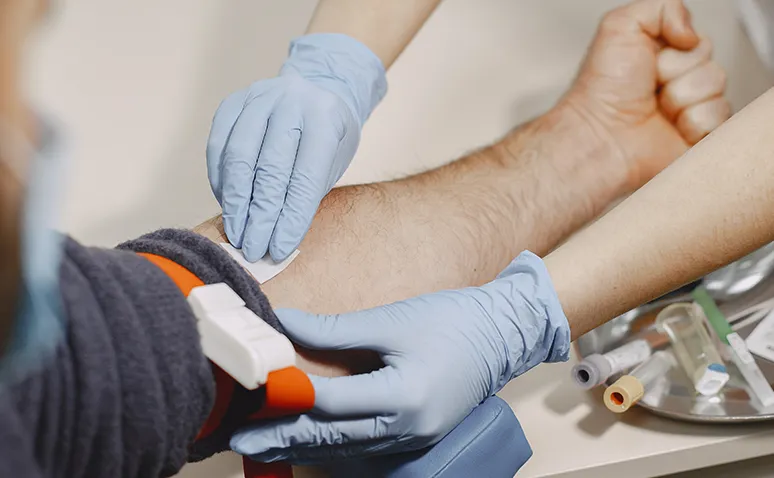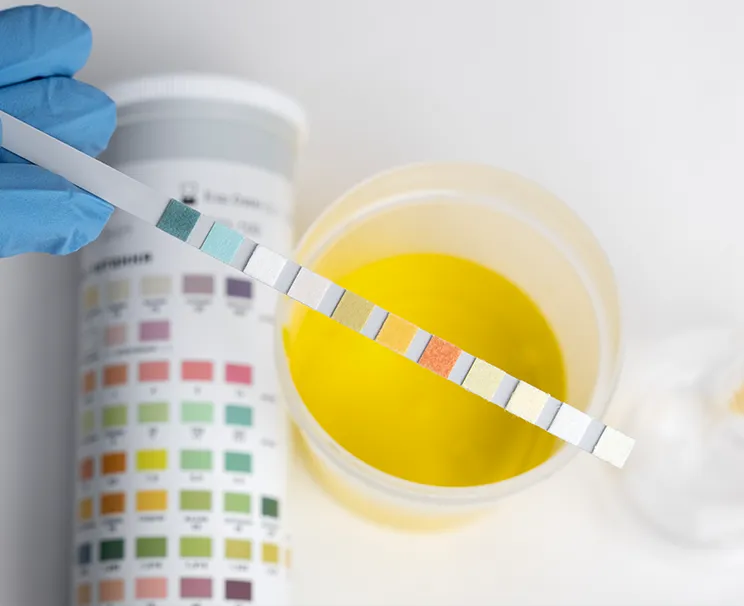The cystic fibrosis screening test is a vital procedure conducted in the early days after birth to facilitate the early diagnosis of the disease. By collecting a heel blood sample, this test enables the diagnosis of the baby before symptoms become apparent.
The cystic fibrosis screening test is structured as a process designed to facilitate the diagnosis of babies at risk. If the data obtained in the initial test are abnormal, further tests such as the sweat test and genetic analysis are performed to clarify the diagnosis. This test saves time in the fight against cystic fibrosis, accelerates the treatment process, and provides an opportunity to prevent complications.
What is Cystic Fibrosis Screening Test?
Cystic fibrosis is a hereditary disease that primarily affects the respiratory and digestive systems. In this condition, the body’s secretions become thicker and stickier than normal. These secretions accumulate, especially in the lungs, leading to infections and breathing difficulties.
If not diagnosed early, the disease progresses and can lead to serious health complications. Therefore, the cystic fibrosis screening test, administered within the first days of life, plays a critical role in early diagnosis.
In Türkiye, the screening program carried out by the Ministry of Health aims to diagnose the disease before symptoms appear. Thanks to this test, which is applied to all newborns, early intervention can improve the quality of life. Especially babies with a family history of the disease or those showing various symptoms are closely monitored throughout the test process.
The screening process is carried out as follows:
- A blood sample is taken from the baby’s heel after birth.
- The collected blood is sent to screening centers for biochemical analysis.
- If abnormal values are detected, a second sample is taken for additional testing, and the results are confirmed.
- Throughout the process, specialists provide detailed information to parents and offer necessary guidance.

If a high risk is detected in the screening test, advanced diagnostic tests are applied. These tests ensure an accurate diagnosis and allow early treatment initiation. With expert evaluation, the risk of disease progression decreases, and the child’s life expectancy and quality of life significantly improve.
In the early stages of the disease, there are usually no significant clinical signs. However, if the diagnosis is made based on symptoms that develop over time, the treatment process may be more challenging. Identifying the suspicion of cystic fibrosis early through the test conducted immediately after birth is crucial.
Early diagnosis raises awareness among families and reduces the burden on the healthcare system. Screening tests are an effective step to prevent serious complications that may occur in the future.
Where is the Cystic Fibrosis Screening Test Conducted?
Cystic fibrosis is a lifelong genetic disease that affects multiple systems and has severe consequences. In this condition, the accumulation of thick mucus primarily affects the respiratory tract, making it difficult to breathe. If the diagnosis is delayed, permanent damage to lung functions may occur, making the treatment more complex. Therefore, screening tests conducted for the early diagnosis of cystic fibrosis are of great importance.

Cystic fibrosis is a lifelong genetic disease that affects multiple systems and has severe consequences. In this condition, the accumulation of thick mucus primarily affects the respiratory tract, making it difficult to breathe. If the diagnosis is delayed, permanent damage to lung functions may occur, making the treatment more complex. Therefore, screening tests conducted for the early diagnosis of cystic fibrosis are of great importance.
In Türkiye, the cystic fibrosis screening test is included in the newborn screening program conducted with government support. Within this scope, a family physician or the maternity ward collects a blood sample from the baby a few days after birth. The testing process begins with this sample. The purpose of the newborn screening system is to identify babies who are asymptomatic but at risk.
The blood samples collected from the heel are analyzed in specialized laboratories, and the results are evaluated by specialists. If a deviation in the values is detected, the family is informed for a second test. In most cases, a sweat test is conducted to confirm the diagnosis. This test measures the amount of chloride in the sweat to determine the presence of the disease. Additionally, genetic tests may also be utilized for advanced diagnosis.
In the early stages, cystic fibrosis symptoms usually present as respiratory distress, feeding difficulties, and frequent infections. In such cases, specialists quickly assess the risk of cystic fibrosis in the baby. Once the diagnosis is confirmed, the family is informed, and an appropriate treatment plan is provided.
Experts emphasize that early diagnosis significantly increases the life expectancy of children diagnosed with cystic fibrosis. Babies who frequently experience respiratory tract infections should be carefully monitored for this disease.
As the diagnostic process progresses and the tests are confirmed, the condition defined as cystic fibrosis (CF) becomes clear. After this stage, personalized treatment plans are initiated to combat the disease. Therefore, knowing where and how the test is conducted is a crucial starting point for families.
For cystic fibrosis screening and more information, contact Denge Tıp immediately.











